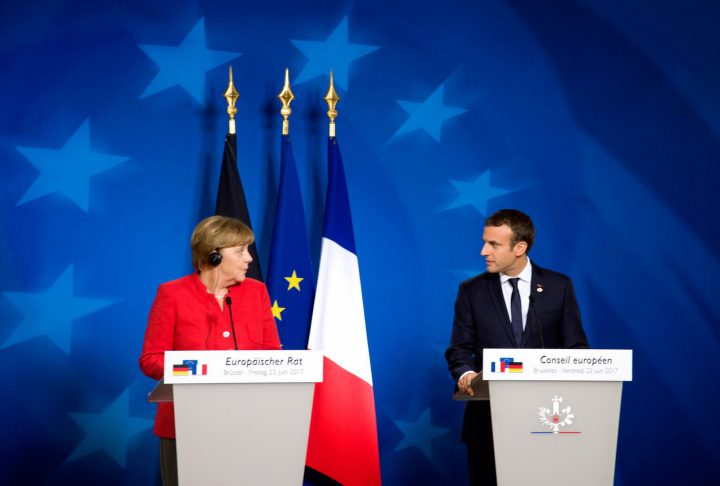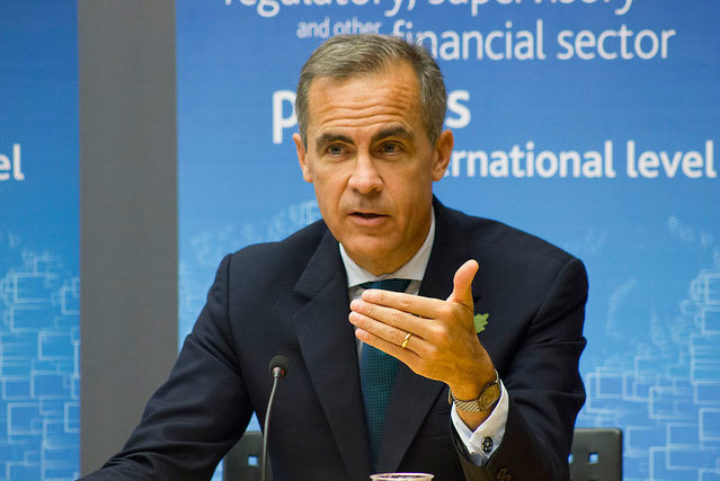Merkel stokes climate fires under G20
German hosts nail climate change colours to the mast for this week's summit - but will US Trump them?
By Richard Black
Share
Last updated:
For this week’s G20 summit, Donald Trump comes to a Germany whose leader is not just talking the talk on climate change but shouting it from the rooftops.
Last week Angela Merkel made the bluntest of speeches to the German Parliament in which she confimed her commitment to the Paris Agreement, arguing that ‘those who think that the problems of this world can be solved with isolationism or protectionism are terribly wrong.’
To find reasons for her vehemence, one doesn’t have to look as far as the other side of the Atlantic. She has an election coming up fast, and securing the integrity of the EU is a top campaign issue - plus, no German leader going to the polls would be weak on climate change.

Across the border, new French President Emmanuel Macron also wants a strong summit declaration because climate change is one of his signature issues – progressive and a key concern for younger voters, but with a nationalist flavour too given that the key international agreement is named after his capital city.
The experienced German and the sexy French newcomer have already established a remarkable political rapport, not so much singing from the same hymn sheet as duetting in close harmony so as to block out the inconvenient cacophony of Brexit leaking from the headphone-wearing Britons in the crowd.
And for both, being strong on climate change also differentiates them from Donald Trump – usefully, given that his approval ratings in Europe are through the floor.
Asian rivals join forces
On the issue of isolationism and protectionism they’ve been joined by the most influential leader of all, China’s President Xi Jinping. In the German newspaper Die Welt, he penned an article titled ‘Für eine bessere Welt’ (For a better world). As with the speech he delivered in Davos earlier in the year, it's a robust defence of globalisation that also backs the Paris Agreement that all signatories should stick to.
Other leaders have pitched in, including Japanese Prime Minister Shinzo Abe, who wrote in Handelsblatt that climate change is a global problem that nations must address together. The Russian envoy to Berlin also criticised Trump’s move to quit the Paris Agreement in an interview in German media, and reiterated Russia’s commitment to it.
One interesting corollary of all this is that climate change and free trade have become linked in a way that hasn’t always been evident before. Arguably Donald Trump started this, by questioning international agreements in both arenas. Which means that internationalist leaders such as President Xi, Chancellor Merkel and President Macron speak favourably of both – often in the same sentence.
Twenty reprises seven?
So on the surface of it, Donald Trump is in one camp and everyone else in another – much as it was at the G7 summit earlier in the year, which concluded with a ‘G6+1’ communiqué in which the US agreed to differ from the rest on clean energy and climate change.

So could we be heading for a ‘G19+1’ conclusion this time around?
Maybe. For the reasons listed above, most leaders aren’t going to have any truck with a declaration that calls the Paris Agreement into question. Yet that’s where Donald Trump is. So on the surface, there’s no form of words that would please everyone.
Among Europeans, the principal concern will be whether another country would put itself in the US camp. Top of the suspect list comes Saudi Arabia – not so much because of its historical antipathy to limiting carbon emissions but because of the peculiar diplomatic position since it led a number of Gulf states to put a blockade on Qatar.
President Trump’s gushing words for the Saudis could pull them closer to the US position on climate change. But a number of factors push in the opposite direction. For one thing, apart from Mr Trump, there’s been zero Western support for their blockade; so, annoying the Europeans more wouldn’t be sensible.
One wonders how solid the new love-in with the US is, too. The biggest threat to Saudi oil revenue at the moment is rising US shale output. And there is the little issue that Qatar hosts Al Udeid, the biggest US air base in the Middle East.
So, for Saudi Arabia to side either firmly with or firmly against Mr Trump at the G20 summit is fraught with peril. Much more sensible, one might think, is to stay in the background and take a grey position on everything.
If not Saudi Arabia, then who might align with Mr Trump? Russia might be a contender. But Russia’s words on the Paris Agreement have been as strong as anyone’s.
So, while 19-1 is possible, 18-2 or 17-3 look pretty unlikely.
And what of the UK? Frankly, it's likely to be a bit-part player. Prime Minister Theresa May has indicated she will do a bit of a 'Now look here, Donald' when they meet, confirming her government's support for the Paris Agreement.
But the realpolitik of Brexit means that what Number 10 wants from the US above all else are indications that a US-UK free trade deal is coming, gilding the image of those elusive sunlit uplands with additional lustre. And you don't get that by telling the US President he's a very naughty boy.
Money talks... but who's listening?
The German hosts, appear still to be hoping that some sort of 20-0 outcome is possible.
The draft communiqué has reportedly changed by a huge amount since its first draft. No point in doing that - in risking the domestic political opprobrium it might bring - unless you think it might generate a compromise outcome.
And the latest leak indicates that indeed a compromise position may be emerging - allowing the 19 to line up four-square behind the Paris Agreement while explicitly acknowledging President Trump's declared intention to withdraw. (I say 'declared intention' because it's far from certain that will ever happen, as I've previously explained.)

The one thing we can say with confidence about the G20 declaration is that it won’t be ambitious on climate change.
The four-to-one imbalance in public financial support for fossil fuels over renewables won’t be tackled in Hamburg. Neither will the report of the Task Force on Climate-related Financial Disclosures (TCFD), to be presented to leaders during the summit, shape the final communiqué.
If it had, that would have been some outcome, given that the report – led by Bank of England Governor Mark Carney and former New York City Mayor Michael Bloomberg – called for businesses to disclose all climate change-related risks and opportunities, and received the support of companies with a combined market capitalisation of around $3.5 trillion and financial institutions responsible for assets of about $25 trillion.
That’s not the only sign from the world outside politics of a desire for leaders to step up the pace of climate change action. Nearly 400 global investors who between them manage more than $22 trillion in assets called for G20 leaders to stand by their commitments to the Paris Agreement at the Hamburg summit. The C40 group of mayors showcased a joint pledge by more than 250 US cities to reduce emissions in line with the Paris targets.
However, none of this means that climate change will be the summit's defining issue. Other pressing issues include North Korea and the Middle East, as well as global trade.
But the framing of climate change alongside free trade as something that marks countries out as either global players or isolationists means that it is now inextricably linked with other issues close to the G20's collective heart.
Driven by the remarkable triumvirate of China’s muscle, Mrs Merkel’s gravitas and Emmanuel Macron’s va-va-voom, but reined in by President Trump's equally remarkable iconoclasm, the signs are that this summit certainly won’t be boring.
Share